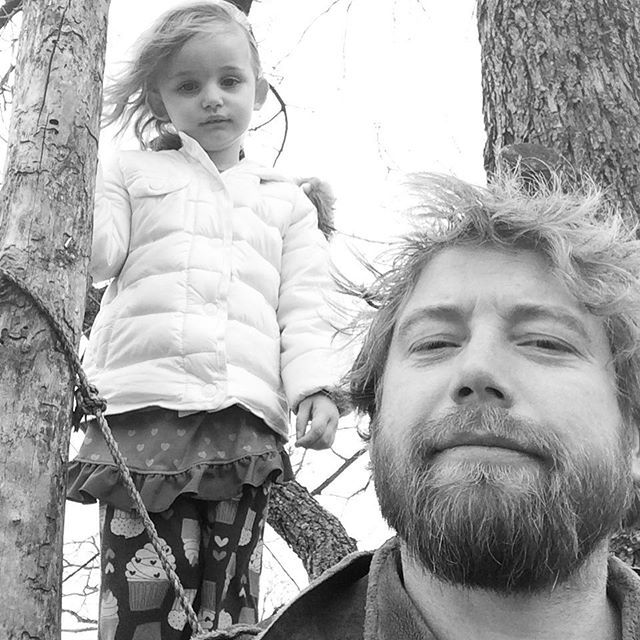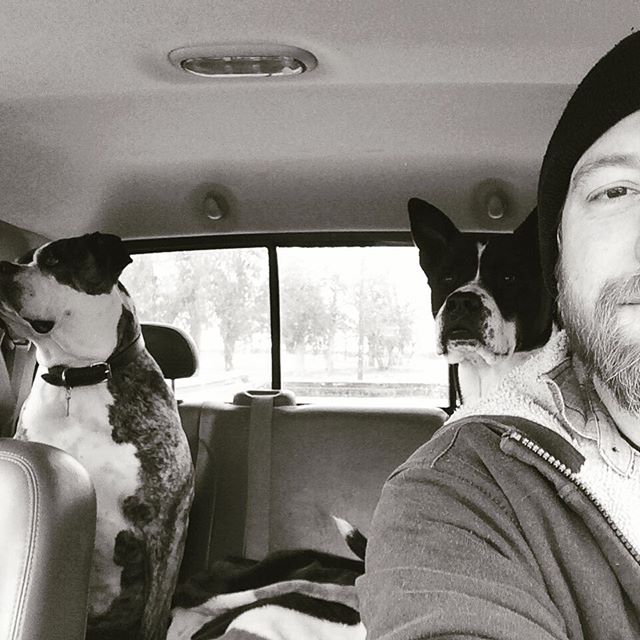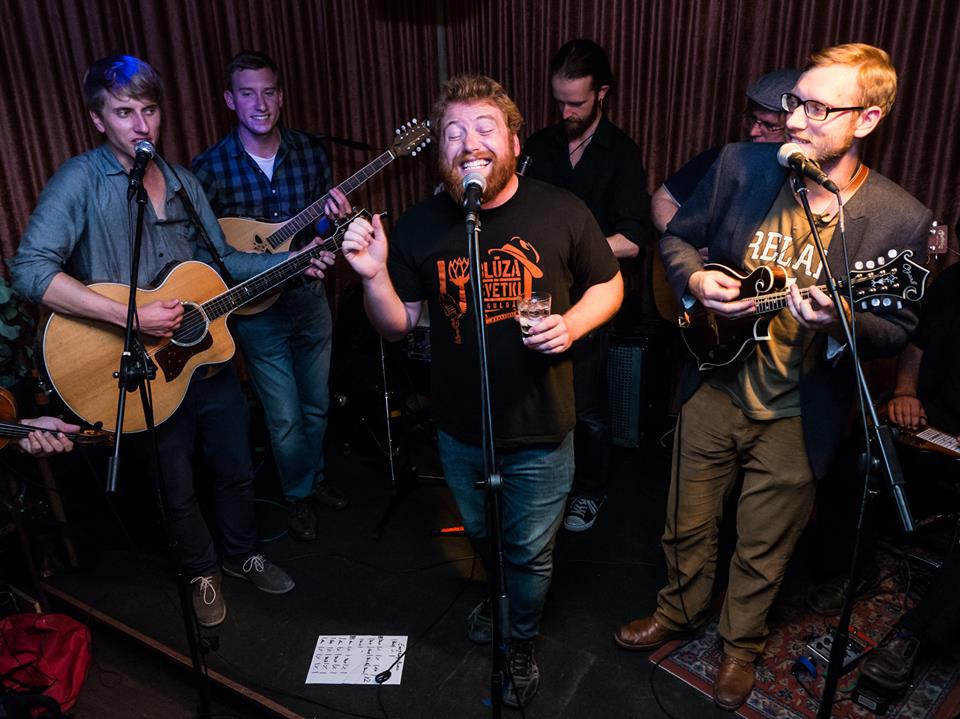Sick Lit Magazine: As I listened to your LP [Uncouth Pilgrims] from beginning to end, I heard sounds reminiscent of Robert Earl Keen, Stevie Ray Vaughn all the way over to the other end of the spectrum at Rob Zombie. I love your range and diversity–all of this being said, what largely inspired this range? Many people have compared you to Tom Waits over the years; I think that is largely attributed to the grit and soul in your voice. However, I think in terms of style, yours is quite different. In fact, I think one could just as easily compare the intensity of your voice to that of James Brown.
Keegan McInroe: Oh wow! James Brown and Rob Zombie are two I haven’t heard before. Tom Waits I’ve heard often, even before I knew who Tom Waits is. He’s definitely an influence, though. And there are other musical influences, of course, from old country and blues and folk, but perhaps the largest inspiration for the particular sounds of the album was two-fold: the songs themselves and the musicians my co-producer Ben Napier and I chose to help us color the songs with.
I had decided on the theme and title for the album before most of the record was written. Uncouth Pilgrims is a phrase I got and held onto years ago from Mark Twain’s travelogue The Innocents Abroad, and whereas his pilgrims were religious in nature, the pilgrims on Uncouth Pilgrims are romantic. But love, despite being the perhaps assumed end goal of a romantic pilgrim, often isn’t. So sometimes the songs and stories called for a more gentle, romantic treatment, but certainly some called for a more base, lusty, and grittier handling. And of course, the way those more gentle and less gentle songs come through, will be filtered through my rootsy musical influences.
I’ve been very fortunate to get to know and become friends with many great musicians in the Fort Worth [Texas] scene, in particular. And, as I don’t have a set band, per se, there’s a lot of freedom to bring in musicians that you feel will serve the song or push the song in a direction you’d like to see it take. Of course, sometimes in that process, you end up with some musical moments that are quite unexpected, something quite beyond the demoed idea. And for this record, we did a great portion of the more electric tracks live, so then that really carries some energy into songs that might not occur in a more heavily stacked and overdubbed session.
Ultimately, the overall and diverse sonic feel of the album is very much what I had set out to achieve, but certainly there were also many surprises that came about from all the various minds coming together to bring the thing to life. Though, from my work on my previous albums, these surprises aren’t unexpected — if that makes sense. You know there will be happy accidents and surprises when you set out. The surprises and bringing to life of the songs is one of my favorite parts of the process.

SLM: Uncouth Pilgrims goes from upbeat ballads to fast-paced bluesy, rock with sick guitar riffs, to songs with a choir in the background. It’s truly a beautiful record. What artists/musicians did you listen to growing up? Who would you say shaped your style?
KM: Thank you so much! To be honest, most of my time growing up was listening to whatever was coming out of popular country music on the radio, though I did get a little Marty Robbins and Jimmy Dean from my grandmother’s record player. But it wasn’t until I listened to the Grateful Dead’s American Beauty album when I was about 14 or so, that I started desiring to play music myself. So the Dead’s more folk, acoustic stuff was a big early influence, as was Jim Croce and Ben Harper — first song I learned how to play was Harper’s tune “Burn One Down” — and Widespread Panic, who I spent a lot of time following around the country slinging bootleg t-shirts from the back of my VW Bug.
As I began to play more, people like Johnny Cash, Willie Nelson, Bob Dylan, and Tom Waits all became bigger influences. And it wasn’t until I started listening to and watching Townes van Zandt’s and Mississippi John Hurt’s fingerpicking styles that I started working out that part of my playing, so they’re probably two of my biggest guitar influences at the moment. They’ve definitely helped shape whatever style I may have.

SLM: What’s playing in your CD player/record player/iphone right now?
KM: One unusual thing now is a really great Hunter S. Thompson boxset of his personal voice-recorded notes from various different assignments he found himself working on. There’s been a heavy dose of David Bowie lately. There’s the pretty constant Bob Dylan and Tom Waits and Townes van Zandt and Willie Nelson presence. Strangely, though, often when I’m alone or driving, I kind of prefer silence to listening to music. One is constantly inundated with music and voices, so I realized several years back that I increasingly will find myself sitting in silence over turning on the radio or something.
SLM: What inspires your songwriting?
KM: Heartbreak in it’s various forms, predominately. Melancholy and rain and grey skies are inspiring. But also travel. Travel and the inevitable stories from the road are a big inspiration for this latest album.
SLM: Tell me about some of the most exciting and/or humbling experiences you’ve encountered thus far in your musical career.
KM: For me the most exciting part of my music career is being able to travel like I have. Back in October I just returned from my sixth tour of Europe since 2012, and I am planning the next tour for this coming summer. I absolutely love getting to explore Europe and the United States and meet and get to know the people and cultures in the various places. Music has been a great vehicle for that.
Travel can also be quite humbling, as it can challenge preconceived notions and ideologies that might be lingering somewhere inside you.
It’s also quite humbling and powerful anytime someone comes up to me to tell me about how this or that song touched them, what it meant to them, how it helped them.
SLM: What are some of the pros and cons of the music industry today? What are some of the issues you have with it?
KM: Some pros that come to mind are the unbelievable and amazing growths in technology, both online and in recording, which has made it possible for anyone and everyone to get their art out to the world without needing thousands and thousands of dollars to do it. To some degree, this has also brought some of the power back to the artist and out of the hands of record executives and so on.
Of course, those same amazing technologies have also brought their own challenges in terms of over-saturation of online and physical markets and listener fatigue. But I prefer the more decentralized nature to the fat cat gate keepers deciding who can and can’t be heard — which they still have plenty of say in.
[Some of Keegan’s Instagram photos]
SLM: For some of our readers who may not be familiar with you, your musical talent and your sound, where can we listen to your new LP? Where can we buy it? Are you touring? And, lastly, do you have anything released on vinyl?
KM: This album and all of my previous albums — as well as up to date touring information — are available directly from my website (http://www.keeganmcinroe.com/albums) for name-your-own-price download.
You can also get a digital or physical copy from CD Baby at http://www.cdbaby.com/cd/keeganmcinroe3.
If you prefer iTunes, it is available here: https://itunes.apple.com/us/album/uncouth-pilgrims/id1069266856.
And it’s available to stream on Soundcloud: http://www.soundcloud.com/keegan-mcinroe.
I am playing around Texas some, including the album’s release party in Fort Worth at Lola’s Saloon on February 13. And plans are coming together for a return tour in Europe this summer.
I would love to have the new album released on vinyl, but unfortunately the funds aren’t there at the moment to make that happen. Which is a pity, because I’d love to hear it that way. I am confident somewhere down the road, that will happen.
SLM: How have your musical influences changed over the years? How has it affected your sound [if at all]?
KM: My musical influences have grown and expanded, but I don’t know how much I’d say they’ve changed. The initial influences are still present. They just have more company now.
SLM: Since we are also a literary journal, would you mind telling some of our readers about your writing career?
KM: My writing career, aside from songwriting, has been pretty limited to this point. In 2001, I was inducted into the International Society of Poets, a far loftier-sounding designation than it is, I assure you. I’ve done a small amount of writing for the online news site Digital Journal, particularly during the Occupy Dallas protests.
Most noteworthy, I suppose, would be the online column I wrote for the Fort Worth Weekly during the summers of 2013 and 2015 called Texas Troubadour Abroad, wherein I shared some of my experiences from the road.
I hope to do much more writing in the future. I currently have about three to five novels/screenplays/who-knows-whats in long incubation waiting to be birthed, but there’s no real sign there’ll be any fresh hatchlings outside of songs in the near future as I am fairly busy pushing this new record, booking shows, and getting ready to hit the road as much as possible in this new year.
SLM: What piece/pieces of advice would you give to a struggling writer or musician who’s been rejected over and over again, on the verge of quitting?
KM: Oh boy. I think one of the biggest things is to find out what’s really important to you. If having a bunch of material things is important, having a nice place to live, a nice car to drive, and so on, then probably quitting isn’t a bad idea, especially insofar as looking at it as a way to make a living. Even when you’re real good and somewhat established, it’s often quite difficult to make much money, though certainly there are ways.
However, if the writing is more important, if the freedom of the lifestyle of a so-called artist is appealing in its reality — versus the romanticized ideal — if the pushed lifestyle we’re all indoctrinated to believe we need and must achieve is not so much a concern, or better yet if it’s somewhat anathema to you, well then continue writing and create the reality you wish for yourself.
Create the reality you wish for yourself, either way, in every and any way you’re able.
But more practically, patience is important. And along a similar line, nothing is more discouraging and less helpful than comparing yourself to others. Don’t worry about what Bob Dylan was doing at your age. That’s gonna hurt. Look at what you’re doing now, what you want to be doing tomorrow and how you can improve, and take the practical steps to get you closer to there.
SLM: What’s the best venue you’ve ever played?
KM: Probably the castle I played this past summer for the Sigulda Blues Festival in Latvia.
SLM: Tell me something that not many people know about you.
KM: I got very involved in Ron Paul’s grassroots campaign for president in Fort Worth in 2008. It led to me getting to actually play before he spoke on two different occasions. He was very gracious, and actually the first time, he even used my p.a. so he spoke into the same microphone for his speech that I use night after night.

***
To learn more about Keegan McInroe and his music, please see the links below:
Facebook:
Twitter:
Soundcloud:
SLM’s favorite song from McInroe’s LP Uncouth Pilgrims:
or you may listen to it here:





I met Keegan on a bus ride from Vilnius to Riga one hot, August day in 2013. Nice chap. Kinda lost me on the Ron Paul reference. But politics aside, talented and friendly fellow.
LikeLiked by 1 person
Gorgeous music and a great interview:)
LikeLiked by 1 person